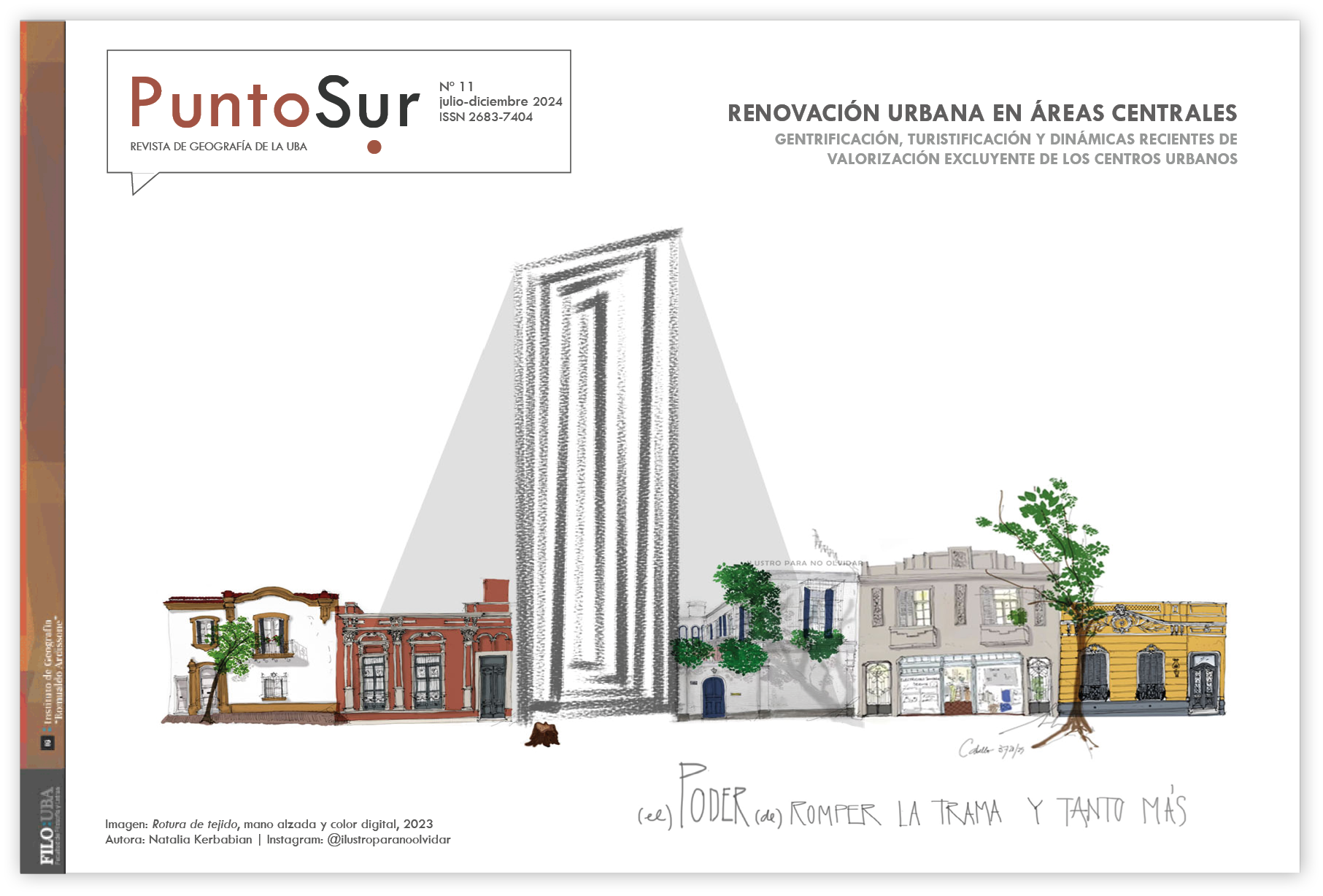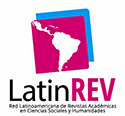Valparaíso UNESCO Heritage: State-Directed Touristification and the Voices of a Disputed Urban Cycle
Keywords:
Urban govern; touristification, heritage; urban development, Unesco
Abstract
Since the second half of the 20th century, Latin American heritage cities have experienced deterioration in their historic centers and neighborhoods, leading to real estate and tourism-driven rehabilitation efforts. This trend has prompted states to seek international funds and recognitions to facilitate these urban interventions. This article analyzes the direction given to urban policies and programs following the UNESCO World Heritage Site designation in Valparaíso, as well as the perspectives of community organizations on these urban transformations. Through interviews with political actors and community leaders, the article examines the objectives, tools, visions, and outcomes associated with these policies. The case of Valparaíso illustrates a tourist-driven gentrification process led by the central state through programs, plans, and subsidies that have promoted a tourist-real estate renewal in part of the UNESCO site. This cycle of heritage urban renewal is contested by communities due to the exalted heritage values, selective rehabilitation of sectors, loss of neighborhood life, and displacement of residents. Valparaíso highlights the role played by Latin American states in the processes of touristification and gentrification.Downloads
Download data is not yet available.
References
Andueza, P. (2010). La política de activación patrimonial en Valparaíso: crítica y propuestas. Encuentro Sociedad Chilena de Políticas Públicas.
Amendola, G. (2000). La ciudad postmoderna: magia y miedo de la metrópolis contemporánea. Celeste Ediciones.
Barrero, M., & Jover, J. (2020). Paisajes de la turistificación: una aproximación metodológica a través del caso de Sevilla. Cuadernos Geográficos, 60 (1), 13-34. https://doi.org/10.30827/cuadgeo.v60i1.13599
Caceres, C. (2019). Turismo, gentrificación y presión por desplazamiento en los cerros Concepción y Alegre de Valparaíso. (Tourism, gentrification and pressure by displacement in the Concepción and Alegre hills of Valparaíso) INVI, 34(97), 157-177.
De la Calle, M. (2019). Turistificación de centros urbanos: clarificando el debate. Boletín de la Asociación Española de Geografía, 83(2829), 1-40. https://doi.org/10.21138/bage.2829
Carrión, F. (2007). Financiamiento de los centros históricos de América Latina y el Caribe. Ecuador: Flacso.
Carrión, F. (2010). El laberinto de las centralidades históricas en América Latina. Quito: Ministerio de Cultura.
Cima, M. (2013). Análisis del proceso de puesta en valor del patrimonio en Valparaíso: De la intención a la práctica de los instrumentos y acciones organizadas entre 2003 y 2013 (Tesis para optar al grado de magister en desarrollo urbano). Universidad Católica de Chile.
Cocola-Gant A (2018). Tourism gentrification. In: Lees L and Phillips M (eds), Handbook of Gentrification Studies, Cheltenham and Northampton: Edward Elgar Publishing, 281–293.
Cocola-Gant A (2019).Gentrificación turística. En Cañada, E y Murray, I (Eds), Turistificación global, perspectivas críticas en turismo (pp. 291-308), Barcelona, España: Icaria editorial.
Delgadillo, V. (2015). Patrimonio urbano, turismo y gentrificación. In: Perspectivas del estudio de la gentrificación en México y América Latina. Delgadillo, Víctor; Díaz, Iban & Salinas, Luis (Ed.), p. 113-132. México D.F., México: Universidad Nacional Autónoma de México.
DiGaetano, A., & Klemanski, J. S. (1993). Urban regime capacity: A comparison of Birmingham, England, and Detroit, Michigan. Journal of Urban Affairs, 15(4), 367-384.
Dit Chirot, C. (2019). Rematerializar los estudios turísticos. En Cañada, E y Murray, I (Eds),
Turistificación global, perspectivas críticas en turismo (pp. 75-90), Barcelona, España: Icaria editorial.
Gotham K F (2005) Tourism Gentrification: The case of New Orleans’ Vieux Carre. Urban Studies 42(7), 1099-1121.
Hall, T; Hubbard, P. (1996). The entrepreneurial city: new urban politics, new urban geographies?. Progress in human geography, (20) 2, p. 153-174.
Hayes, M. (2020). The coloniality of UNESCO’s heritage urban landscapes: Heritage process and transnational gentrification in Cuenca, Ecuador. Urban Studies. 57. 004209801988844. 10.1177/0042098019888441.
Harvey, D. (1989). From Managerialism to Entrepreneurialism: The Transformation in Urban Governance in Late Capitalism. Geografiska Annaler. Series B, Human Geography, 71(01), p. 3-17.
Hiernaux, D, y González, C. (2014). Turismo y gentrificación: pistas teóricas sobre una articulación. (Tourism and gentrification: theoretical clues about an interaction) Norte Grande geography journal, (58), 55-70. https://dx.doi.org/10.4067/S0718-34022014000200004
Janoschka, M. (2016). Gentrificación, desplazamiento, desposesión: procesos urbanos claves en América Latina. (Gentrification, displacement, dispossession: key urban processes in Latin America) INVI, 31(88), 27-71.
Jiménez Vergara, C., & Ferrada Aguilar, M. (2003). Los valores universales del patrimonio arquitectónico y urbano en Valparaíso. Urbano, 6(8), 32–47. Recuperado a partir de http://revistas.ubiobio.cl/index.php/RU/article/view/560.
Jover, J. y Díaz-Parra, I. (2019). Gentrification, transnational gentrification and touristification in Seville, Spain. Urban Studies. Retrieved from: https://doi.org/10.1177/0042098019857585
Kearns, A & Paddison, R. (2000). «New challenges for urban governance». Urban Studies, 37(5-6), 845-850.
López-Morales, E. (2019), “State-Led Gentrification” in The Wiley-Blackwell Encyclopedia of Urban and Regional Studies https://doi.org/10.1002/9781118568446.eurs0321.
López, E., Meza, D., y Gasic, I. (2014). Neoliberalismo, regulación ad-hoc de suelo y gentrificación: el historial de la renovación urbana del sector Santa Isabel, Santiago. Revista de Geografía Norte Grande, (58), 161-177. doi:10.4067/ S0718-34022014000200009.
Navarrete, D. Foreigners as gentrifiers and tourists in a Mexican historic district. Urban Studies. 2020;57(15):3151-3168. doi:10.1177/0042098019896532
Nevarez, L (2014). New money, nice town: how capital works in the new urban economy. New York: Routledge.
Nogue, J. (2009). El paisaje como constructo social. In J. Nogue (Ed.), La construcción social del paisaje. Madrid: Biblioteca Nueva, 2007, 343 p.
McDermott, J. (2019). Towards an icon model of gentrification: Global capitalism, policing, and the struggle for iconic spaces in Mexico City. Urban Studies, 0042098018813065.
Keil, R. (2009). The urban politics of roll‐with‐it neoliberalization. City, vol. 13, no 2-3, p. 230-245.
McDermott, J. (2019). Towards an icon model of gentrification: Global capitalism, policing, and the struggle for iconic spaces in Mexico City. Urban Studies.
Mitchell, D. (2008). New axioms for reading the landscape: paying attention to political economy and social justice. En: J. Wescoat & J. Douglas (eds.), Political economies of landscape change (pp. 29-50). Dordrecht: Springer.
Mossberger, K; Stoker, G (2001). «The evolution of urban regime theory the challenge of conceptualization». Urban Affairs Review, 36(6), 810-835.
Molothc, Harvey. (1976). The City as Growth Machine. American Journal of Sociology, 82 (2), pp. 309-355.
Rolnik, R. (2017). La Guerra de los lugares: la colonización de la tierra y la vivienda en la era de las finanzas. Santiago de Chile: LOM
Pacione, M. (2005). Urban geography: A global perspective. London: Routledge.
Peck, J., Theodore, N., & Brenner, N. (2009). Neoliberal urbanism: Models, moments, mutations. SAIS Review of International Affairs, 29(1), 49-66.
Pierre, Jon (2011). The politics of urban governance. New York: Palgrave MacMillan.
Plan estratégico para el destino turístico de Valparaíso “Plan Rumbo”. http://www.slideshare.net/DRKIMBO/plan-estratgico-para-el-destino-turstico-valparaso (revisado en Junio, 2022).
Pozo, N. (2012). Imaginario Social sobre la Incorporación de Valparaíso en la lista de Patrimonio Mundial de la Humanidad de UNESCO”. Tesis presentada para obtener el grado de Magíster en Antropología y Desarrollo. Universidad de Chile.
Rigolon, A., y Németh, J. (2019): Toward a socioecological model of gentrification: How people, place, and policy shape neighborhood change, Journal of Urban Affairs, DOI: 10.1080/07352166.2018.1562846
Sequera, J. (2020). Gentrificación: capitalismo cool, turismo y control del espacio urbano. Madrid, España: Catarata.
Stoker, G., 1995. ‘Regime Theory and Urban Politics’. In D. Judge et al., Theories of Urban Politics.
Stone, C. (1989). Regime Politics Governing Atlanta 1946-1988. Lawrence: Kansas University press.
Subsecretaría de desarrollo regional y administrativo (2009). Informe final de evaluación Programa de recuperación y desarrollo urbano de Valparaíso. Subdere.
Trivelli P., Nishimura, Y. (2010). The Sustainability of Urban Heritage Preservation: Interventions to Support and Residential Investments in Urban Heritage Areas of latin America and the Caribbean. Valparaíso
Vargas, D. (2018). Valparaíso: La construcción de una imagen urbana de proyección mundial. Santiago: Ril Editores.
Vargas, D. (2018). Valparaíso: La construcción de una imagen urbana de proyección mundial. Santiago: Ril Editores.
Vergara-Constela, C., y Casellas, A. (2016). Políticas estatales y transformación urbana:¿ hacia un proceso de gentrificación en Valparaíso, Chile?. EURE (Santiago), 42(126), 123-144.
Wylie, J. (2007). Landscape Routledge.
Yrigoy, I. (2019). The Role of Regulations in the Spanish Housing Dispossession Crisis: Towards Dispossession by Regulations?. Antipode Vol. 0 No. 2019 ISSN 0066-4812, pp. 1–21
Zukin, S. (1998). Urban Lifestyles: Diversity and Standardisation in Spaces of Consumption. Urban Studies, 35(5–6), 825–839.
Amendola, G. (2000). La ciudad postmoderna: magia y miedo de la metrópolis contemporánea. Celeste Ediciones.
Barrero, M., & Jover, J. (2020). Paisajes de la turistificación: una aproximación metodológica a través del caso de Sevilla. Cuadernos Geográficos, 60 (1), 13-34. https://doi.org/10.30827/cuadgeo.v60i1.13599
Caceres, C. (2019). Turismo, gentrificación y presión por desplazamiento en los cerros Concepción y Alegre de Valparaíso. (Tourism, gentrification and pressure by displacement in the Concepción and Alegre hills of Valparaíso) INVI, 34(97), 157-177.
De la Calle, M. (2019). Turistificación de centros urbanos: clarificando el debate. Boletín de la Asociación Española de Geografía, 83(2829), 1-40. https://doi.org/10.21138/bage.2829
Carrión, F. (2007). Financiamiento de los centros históricos de América Latina y el Caribe. Ecuador: Flacso.
Carrión, F. (2010). El laberinto de las centralidades históricas en América Latina. Quito: Ministerio de Cultura.
Cima, M. (2013). Análisis del proceso de puesta en valor del patrimonio en Valparaíso: De la intención a la práctica de los instrumentos y acciones organizadas entre 2003 y 2013 (Tesis para optar al grado de magister en desarrollo urbano). Universidad Católica de Chile.
Cocola-Gant A (2018). Tourism gentrification. In: Lees L and Phillips M (eds), Handbook of Gentrification Studies, Cheltenham and Northampton: Edward Elgar Publishing, 281–293.
Cocola-Gant A (2019).Gentrificación turística. En Cañada, E y Murray, I (Eds), Turistificación global, perspectivas críticas en turismo (pp. 291-308), Barcelona, España: Icaria editorial.
Delgadillo, V. (2015). Patrimonio urbano, turismo y gentrificación. In: Perspectivas del estudio de la gentrificación en México y América Latina. Delgadillo, Víctor; Díaz, Iban & Salinas, Luis (Ed.), p. 113-132. México D.F., México: Universidad Nacional Autónoma de México.
DiGaetano, A., & Klemanski, J. S. (1993). Urban regime capacity: A comparison of Birmingham, England, and Detroit, Michigan. Journal of Urban Affairs, 15(4), 367-384.
Dit Chirot, C. (2019). Rematerializar los estudios turísticos. En Cañada, E y Murray, I (Eds),
Turistificación global, perspectivas críticas en turismo (pp. 75-90), Barcelona, España: Icaria editorial.
Gotham K F (2005) Tourism Gentrification: The case of New Orleans’ Vieux Carre. Urban Studies 42(7), 1099-1121.
Hall, T; Hubbard, P. (1996). The entrepreneurial city: new urban politics, new urban geographies?. Progress in human geography, (20) 2, p. 153-174.
Hayes, M. (2020). The coloniality of UNESCO’s heritage urban landscapes: Heritage process and transnational gentrification in Cuenca, Ecuador. Urban Studies. 57. 004209801988844. 10.1177/0042098019888441.
Harvey, D. (1989). From Managerialism to Entrepreneurialism: The Transformation in Urban Governance in Late Capitalism. Geografiska Annaler. Series B, Human Geography, 71(01), p. 3-17.
Hiernaux, D, y González, C. (2014). Turismo y gentrificación: pistas teóricas sobre una articulación. (Tourism and gentrification: theoretical clues about an interaction) Norte Grande geography journal, (58), 55-70. https://dx.doi.org/10.4067/S0718-34022014000200004
Janoschka, M. (2016). Gentrificación, desplazamiento, desposesión: procesos urbanos claves en América Latina. (Gentrification, displacement, dispossession: key urban processes in Latin America) INVI, 31(88), 27-71.
Jiménez Vergara, C., & Ferrada Aguilar, M. (2003). Los valores universales del patrimonio arquitectónico y urbano en Valparaíso. Urbano, 6(8), 32–47. Recuperado a partir de http://revistas.ubiobio.cl/index.php/RU/article/view/560.
Jover, J. y Díaz-Parra, I. (2019). Gentrification, transnational gentrification and touristification in Seville, Spain. Urban Studies. Retrieved from: https://doi.org/10.1177/0042098019857585
Kearns, A & Paddison, R. (2000). «New challenges for urban governance». Urban Studies, 37(5-6), 845-850.
López-Morales, E. (2019), “State-Led Gentrification” in The Wiley-Blackwell Encyclopedia of Urban and Regional Studies https://doi.org/10.1002/9781118568446.eurs0321.
López, E., Meza, D., y Gasic, I. (2014). Neoliberalismo, regulación ad-hoc de suelo y gentrificación: el historial de la renovación urbana del sector Santa Isabel, Santiago. Revista de Geografía Norte Grande, (58), 161-177. doi:10.4067/ S0718-34022014000200009.
Navarrete, D. Foreigners as gentrifiers and tourists in a Mexican historic district. Urban Studies. 2020;57(15):3151-3168. doi:10.1177/0042098019896532
Nevarez, L (2014). New money, nice town: how capital works in the new urban economy. New York: Routledge.
Nogue, J. (2009). El paisaje como constructo social. In J. Nogue (Ed.), La construcción social del paisaje. Madrid: Biblioteca Nueva, 2007, 343 p.
McDermott, J. (2019). Towards an icon model of gentrification: Global capitalism, policing, and the struggle for iconic spaces in Mexico City. Urban Studies, 0042098018813065.
Keil, R. (2009). The urban politics of roll‐with‐it neoliberalization. City, vol. 13, no 2-3, p. 230-245.
McDermott, J. (2019). Towards an icon model of gentrification: Global capitalism, policing, and the struggle for iconic spaces in Mexico City. Urban Studies.
Mitchell, D. (2008). New axioms for reading the landscape: paying attention to political economy and social justice. En: J. Wescoat & J. Douglas (eds.), Political economies of landscape change (pp. 29-50). Dordrecht: Springer.
Mossberger, K; Stoker, G (2001). «The evolution of urban regime theory the challenge of conceptualization». Urban Affairs Review, 36(6), 810-835.
Molothc, Harvey. (1976). The City as Growth Machine. American Journal of Sociology, 82 (2), pp. 309-355.
Rolnik, R. (2017). La Guerra de los lugares: la colonización de la tierra y la vivienda en la era de las finanzas. Santiago de Chile: LOM
Pacione, M. (2005). Urban geography: A global perspective. London: Routledge.
Peck, J., Theodore, N., & Brenner, N. (2009). Neoliberal urbanism: Models, moments, mutations. SAIS Review of International Affairs, 29(1), 49-66.
Pierre, Jon (2011). The politics of urban governance. New York: Palgrave MacMillan.
Plan estratégico para el destino turístico de Valparaíso “Plan Rumbo”. http://www.slideshare.net/DRKIMBO/plan-estratgico-para-el-destino-turstico-valparaso (revisado en Junio, 2022).
Pozo, N. (2012). Imaginario Social sobre la Incorporación de Valparaíso en la lista de Patrimonio Mundial de la Humanidad de UNESCO”. Tesis presentada para obtener el grado de Magíster en Antropología y Desarrollo. Universidad de Chile.
Rigolon, A., y Németh, J. (2019): Toward a socioecological model of gentrification: How people, place, and policy shape neighborhood change, Journal of Urban Affairs, DOI: 10.1080/07352166.2018.1562846
Sequera, J. (2020). Gentrificación: capitalismo cool, turismo y control del espacio urbano. Madrid, España: Catarata.
Stoker, G., 1995. ‘Regime Theory and Urban Politics’. In D. Judge et al., Theories of Urban Politics.
Stone, C. (1989). Regime Politics Governing Atlanta 1946-1988. Lawrence: Kansas University press.
Subsecretaría de desarrollo regional y administrativo (2009). Informe final de evaluación Programa de recuperación y desarrollo urbano de Valparaíso. Subdere.
Trivelli P., Nishimura, Y. (2010). The Sustainability of Urban Heritage Preservation: Interventions to Support and Residential Investments in Urban Heritage Areas of latin America and the Caribbean. Valparaíso
Vargas, D. (2018). Valparaíso: La construcción de una imagen urbana de proyección mundial. Santiago: Ril Editores.
Vargas, D. (2018). Valparaíso: La construcción de una imagen urbana de proyección mundial. Santiago: Ril Editores.
Vergara-Constela, C., y Casellas, A. (2016). Políticas estatales y transformación urbana:¿ hacia un proceso de gentrificación en Valparaíso, Chile?. EURE (Santiago), 42(126), 123-144.
Wylie, J. (2007). Landscape Routledge.
Yrigoy, I. (2019). The Role of Regulations in the Spanish Housing Dispossession Crisis: Towards Dispossession by Regulations?. Antipode Vol. 0 No. 2019 ISSN 0066-4812, pp. 1–21
Zukin, S. (1998). Urban Lifestyles: Diversity and Standardisation in Spaces of Consumption. Urban Studies, 35(5–6), 825–839.
Published
2024-11-14
How to Cite
Cáceres Seguel, C. (2024). Valparaíso UNESCO Heritage: State-Directed Touristification and the Voices of a Disputed Urban Cycle. Punto Sur, (11), 98-117. https://doi.org/10.34096/ps.n11.14331
Section
Dossier
Copyright (c) 2024 César Cáceres Seguel

This work is licensed under a Creative Commons Attribution 4.0 International License.






















